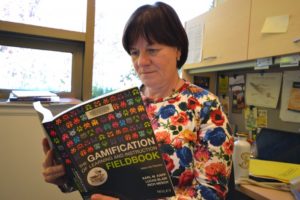Camosun director of learning services Sybil Harrison has had some hard days recently. Some really hard days. She gets emotional recalling the day she locked the doors to the Alan Batey Library and Learning Commons last week. It was the hardest day of her 30-year career, and it came as a result of the COVID-19 pandemic.
Before the library closed, she put up signs, constantly provided hand sanitizer, and told students the three words we’ve all heard so many times now: wash your hands. The last days before the library closed were challenging, she says; some students simply weren’t respecting social-distancing guidelines. But for her, the most pain comes from thinking about closing those library doors.

“I just get emotional even saying it now. When you’ve had a life’s work… to have to close your doors is heartbreaking,” she says. “Heartbreaking.”
Libraries are the very essence of education and public knowledge, as far as Harrison is concerned.
“I never ever thought in my career that I would see this, that we would ever close our doors,” she says.
Since closing the library, Harrison has spearheaded a laptop-lending program at the college that allows students who don’t have access to a computer to get one. They check it out just as they would a book, she says. Many students would otherwise be without a way to complete their classes.
“Many, many students depend on the computers at the library in the college. Most students have a phone, and they’re able to connect that way,” she says. “But I’ve talked to many students who tell me they don’t own a computer at home.”
Harrison isn’t sure about the exact percentage of students who don’t own computers, but through library statistics, she can see what type of device students are using to access library resources; much of the time, she says, it’s a smartphone.
“I can’t imagine completing schoolwork on a phone,” she says. “All of us who work in the library sector, it’s been heartbreaking, cutting off access.”
The library has had the systems in place to lend laptops for a number of years, but the question for Harrison was how to do it in a way that was safe.
“We had… lots of good social distancing,” she says. “We made everybody wash their hands before they came in. We had all of the laptops just set up on a service desk. Students would come forward one at a time, and we would just ask them to place their student card on top of the computer beside our bar code and then I took a photograph, and it went up into my iCloud.”
There is quite a bit of space in the Lansdowne library, which made things a little easier as well. Still, it’s not always easy getting people to follow rules.
“We felt good that we were able to do it practicing in a really safe way,” says Harrison. “Quite honestly, we were all very concerned in those last days before we closed the libraries. Students were, as much as we had signs everywhere… It was challenging.”
Luckily, much of the library is online, and Harrison says she is looking at ways to possibly get hard copies of books to people who need them, depending on how much longer the government’s self-distancing measures go on for.
“We have access to thousands and thousands of electronic journals,” she says. “We have lots of e-books, we have a whole range of resources.”
Some instructors have been in touch for books, and Harrison is working around the clock doing everything she can to get the stacks to those who need them.
“I dropped off books at somebody’s house on Sunday, for example,” she says.
